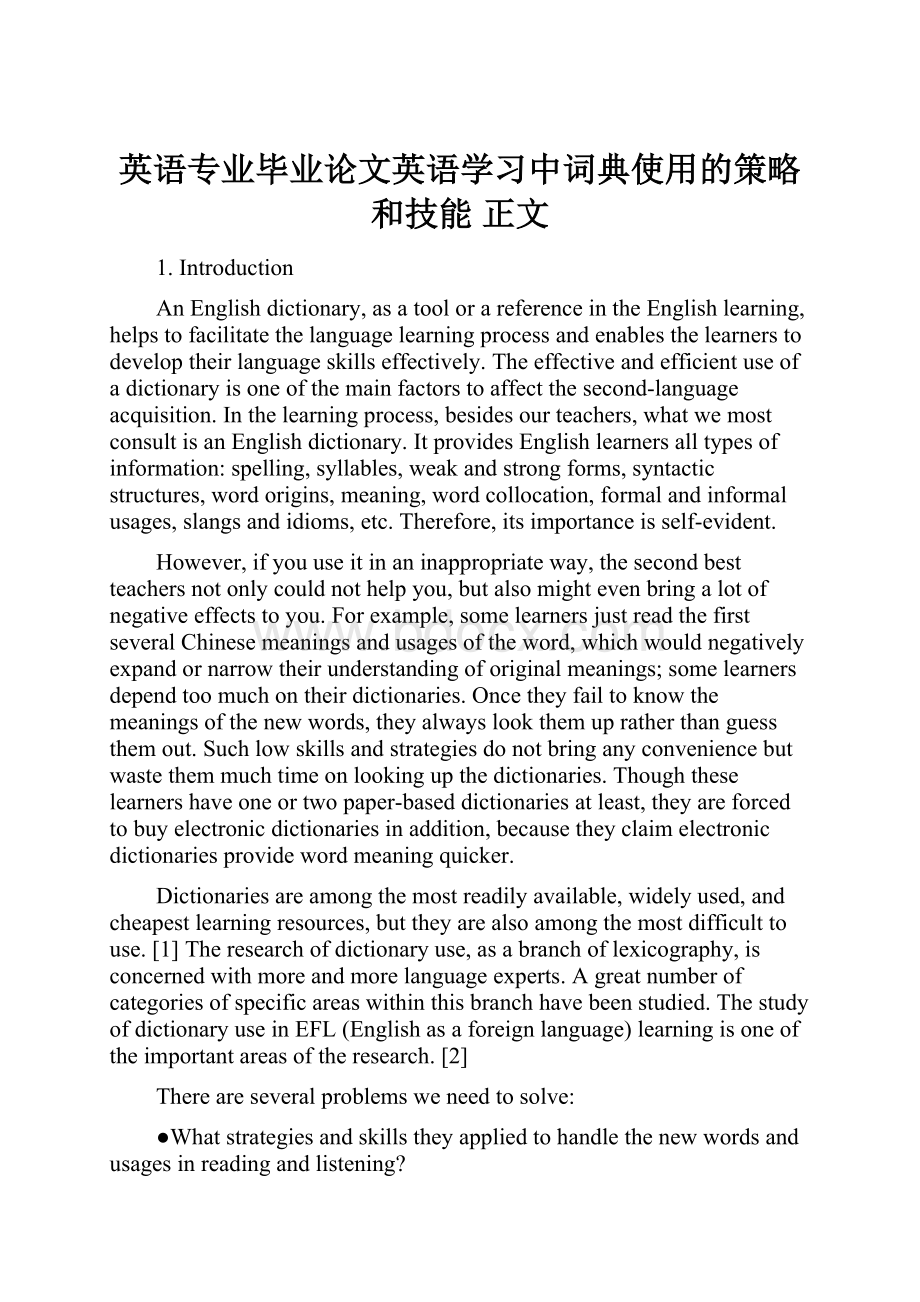英语专业毕业论文英语学习中词典使用的策略和技能正文.docx
《英语专业毕业论文英语学习中词典使用的策略和技能正文.docx》由会员分享,可在线阅读,更多相关《英语专业毕业论文英语学习中词典使用的策略和技能正文.docx(20页珍藏版)》请在冰豆网上搜索。

英语专业毕业论文英语学习中词典使用的策略和技能正文
1.Introduction
AnEnglishdictionary,asatoolorareferenceintheEnglishlearning,helpstofacilitatethelanguagelearningprocessandenablesthelearnerstodeveloptheirlanguageskillseffectively.Theeffectiveandefficientuseofadictionaryisoneofthemainfactorstoaffectthesecond-languageacquisition.Inthelearningprocess,besidesourteachers,whatwemostconsultisanEnglishdictionary.ItprovidesEnglishlearnersalltypesofinformation:
spelling,syllables,weakandstrongforms,syntacticstructures,wordorigins,meaning,wordcollocation,formalandinformalusages,slangsandidioms,etc.Therefore,itsimportanceisself-evident.
However,ifyouuseitinaninappropriateway,thesecondbestteachersnotonlycouldnothelpyou,butalsomightevenbringalotofnegativeeffectstoyou.Forexample,somelearnersjustreadthefirstseveralChinesemeaningsandusagesoftheword,whichwouldnegativelyexpandornarrowtheirunderstandingoforiginalmeanings;somelearnersdependtoomuchontheirdictionaries.Oncetheyfailtoknowthemeaningsofthenewwords,theyalwayslookthemupratherthanguessthemout.Suchlowskillsandstrategiesdonotbringanyconveniencebutwastethemmuchtimeonlookingupthedictionaries.Thoughtheselearnershaveoneortwopaper-baseddictionariesatleast,theyareforcedtobuyelectronicdictionariesinaddition,becausetheyclaimelectronicdictionariesprovidewordmeaningquicker.
Dictionariesareamongthemostreadilyavailable,widelyused,andcheapestlearningresources,buttheyarealsoamongthemostdifficulttouse.[1]Theresearchofdictionaryuse,asabranchoflexicography,isconcernedwithmoreandmorelanguageexperts.Agreatnumberofcategoriesofspecificareaswithinthisbranchhavebeenstudied.ThestudyofdictionaryuseinEFL(Englishasaforeignlanguage)learningisoneoftheimportantareasoftheresearch.[2]
Thereareseveralproblemsweneedtosolve:
●Whatstrategiesandskillstheyappliedtohandlethenewwordsandusagesinreadingandlistening?
●Howdothelearnerssucceedinchoosingtheirsuitabledictionariesinaccordancewiththeirownlevelsandneeds?
●Howoftentheyusethedictionary?
●DothelanguageteachersgivethestudentsenoughinformationandguidanceintheselectionanduseofEnglishdictionary?
●ArethecurrentEnglishmajorsclearaboutthethreedifferentEnglishdictionariesfunctions?
Inlightofthesequestions,wemakearesearch ontwoEnglishmajors’classesinHuizhouUniversity.
2.LiteratureReview
InthecombinationofquestionnaireandinterviewsoffourNormalEnglishclasses,405students,intheForeignLanguagesdepartmentofPutianCollege,ChenYuzhenfindsthattheusingfrequencyofelectronicdictionaryismuchhigherthanthatofpaper-baseddictionary,andjuniorstudents’usingtimesaremorethanseniorstudents’.So,sheprovesthatjuniorstudents’look-upstrategiesaremorematurethanseniorstudents’,andconcludethatstudent’strategiesandskillswillnotincreasewiththesecondlanguagelearningtime.Also,sheproposesthattheteachersshouldhavethesensetotraintheirstudentstheawarenessofusingdictionaries,andtoprovidenecessaryguidanceandenoughtraining.Theyshouldencouragestudentsstudymoreindependently,andboosttheirindependentproblem-solvingabilities.[3]
Withthequestionnaireoftwonon-Englishmajors’classes,90students,intheChemicalTechnologydepartmentofSouthwesternUniversity,FengLinlingfindsoutelectronicdictionaryhasalreadybecomemanynon-Englishmajorsmostextensivetoolinlanguagelearning,becauseitisveryefficienttofindoutthemeaningsofthenewwords.Butwhentomentionelectronicdictionary’spronunciationfunction,onlyahandfulofpeoplebelievethatitisveryhelpful,andtheoverwhelmingmajorityofpeoplebelievethatthefunctionsaresomewhatimportantorunimportant.Bycomparison,traditionalpaper-baseddictionaryisnotonlymoreconducivetolearning,butalsoeasiertomasterEnglishusages.FengLinlingwarnsthatifstudentsaretooreliantonelectronicdictionary,theywouldhavegreatdifficultyinadvancetheguessingabilityofthenewwords.[4]
WiththeinvestigationanalysisandstrategiesontheuseofEnglishdictionariesbynon-Englishmajors,YuanShuoadvisesschoolsandteacherstoincreasestudents’usingtimesofthepaper-baseddictionariesusingtimes,andconsiderotherreferencebooksasthepartofstudents’self-learningability.AlsotheteachersshouldattachgreatattentiontoStudent’spurchaseanduseofthedictionaries.[5]
LiangYulingandLiLeistatethatmoststudentsnotonlylackunderstandingtherelationbetweenEnglishlearningprocessanddictionaries,butalsofailtofullyunderstandthetypesandfunctionsofthedictionaries.Theirignoranceoftheseaspectsoftheknowledgeleadstomanyproblemswhentheyusethedictionary:
a.prefertosmalldictionaryortheelectronicone;b.focusononlyoneorafewsimplefrontInterpretationoftheEnglishwords;c.tooself-confidenttoolookupthedictionaries.Formtheabovereferencetostudents’errorsinusingstrategies;theybelievethatteacherscanguidethestudentsbelowthefollowingaspects:
a.makestudentsfullyunderstandthediversefunctionsofpocketdictionary,electronicdictionaryandpaper-baseddictionary;b.ReadallinformationofanEnglishwordsascompleteaspossible;c.flexibletotheuseanEnglishdictionarywiththecombinationofthecontext.[6]
WangYanhuadividesEnglishlearningintofourlevels:
a.beginning;b.intermediate;c.advanced;d.quasi-bilinguals.ShestatesthatEnglishteachershouldhelpthestudentstochooseanappropriatedictionaryatdifferentstudyinglevelsinaccordancewithstudents’learninglevelsandtheirpurposes.[7]
ZhaoLimingproposesthatmoreexamplesshouldbeprovidedtoguidethelearners.Letthelearnersguessandidentifythemeaningsofthenewwordsinthecontextsasmanyaspossible.Hedoesn’tagreethestudentstousethesefollowingstrategies:
a.lookupthedictionariesoncetheymeetthenewwords;b.avoidstudyingthehardpoints.Inreturn,heemphasizeshisownopinions:
a.theteachersshouldteachlearnerstrytoguessthemeaningsofthewords;b.makesurethelearnersunderstandthemeaningorimpliedinformationascompleteaspossible,andencourageEnglishlearnerstotrytogothroughthesubtledifferencesbetweenEnglishandChinese.HebelievesthesewayswillgreatlyenrichandpromotetheircomprehensionoftheEnglishlanguage.[8]
3.ResearchDesign
Bythecombinationofsomelanguageexperts’insights andmyownthoughts,wetrytomakeoutwhattypesofstrategiesandskillswillbemostefficientinthelearningprocess.Inordertofindoutthebestsolutions,aChinesequestionnairewillbeadoptedinthisinvestigate.
3.1ResearchParticipants
TheresearchparticipantsincludeHuizhouCollege’stwoEnglishclasses,85Englishmajors,asecond-yearclassandthefourth-yearclassseparately.Theselectedclasseshaverepresentativeintheschool.82questionnaireswerevalid,only3questionnaireswereinvalid.Forsomecertainquestionsareincomplete.ThisinvestigationbeganinthemiddleMarch,2008.
3.2InstrumentsandDateCollection
Thequestionnaireiscomposedoffourparts:
Thefirstpartistotrytofindoutstudents’generalknowledgeofthedictionaries.Thesecondpartistofindoutwhichkindofdictionarystudentswouldliketouse.Thethirdpartistogettoknowwhatthelearners’idealdictionariesare.Theforthpartisthatwhenstudentsencounterthenewwordsorexpressionsinreadingandlistening,whatstrategiesandskillswillapply.Thefifthpartishowtohandlethenewwordsinwordanalysis.
4.DataAnalysis
Resultsoftheresearcharediscussedinthispart.Thestrategiesandskillsanalysisaretheprimaryfocusofthispaper.
4.1GeneralKnowledgeaboutthePaper-basedDictionary
Table1whatdothreeitemsmean,Advancedlevel,IntermediatelevelandElementarylevelofEnglishdictionaries?
Table1
A
B
Strategiesandskills
Unknown
Know
Juniorstudents
39%
61%
Seniorstudents
33.3%
66.7%
Average
36%
64%
TheyaremanytypesofEnglishstudents’dictionaries,forexample,paper-baseddictionarieslikebilingualdictionarywithbothChineseandEnglishexplanations,English-Englishdictionary,electronicdictionariesandpcdictionary.
Whatdothreeitemsmean,Advancedlevel,IntermediatelevelandElementarylevelofEnglishdictionaries,mean?
Table1showsthat,over60%ofjuniorandseniorstudentshavealreadyknownthesethreeitems’meaning.Accordingtothevolumeoftheentriesinthedifferentlearningdictionaries,dictionariescanbedividedintothreecategories:
Advancedlevel,IntermediatelevelandElementarylevel.Generallyspeaking,theElementarylevelincludesbelow20,000words,Intermediatelevelrangingfrom20000to40000,andtheAdvancelevelfrom40,000to80,000.Wecannotjudgethequalityofadictionaryjustsimplybyitsnumberofitsentriesbutonitsutilizationandfunctions.Onthebasisoftheirownlevelandneeds,LearnerschooseanEnglishdictionary.
Table2whatarethefunctionsandthedifferencesamongbilingualdictionarywithbothChineseandEnglishexplanations,English-EnglishdictionaryandbilingualdictionarywithChineseexplanationsonly?
Table2
A
B
Strategiesandskills
Unclear
Clear
Juniorstudents
19%
81%
Seniorstudents
16.7%
83.3%
Average
18%
82%
WhatarethefunctionsandthedifferencesamongbilingualdictionarywithbothChineseandEnglishexplanations,English-Englishdictionaryandbilingualdictiona